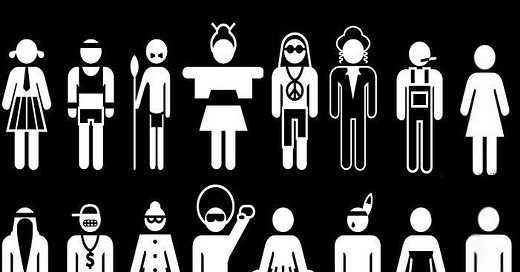Gweilo, Gringo, Gaijin, Gora, Guiri—why do so many derogatory slurs towards white people start with G?
No, it’s definitely not because people think we’re Great. It’s purely coincidental. Gweilo, which is widely used in Hong Kong, means white ghost or white devil. Gringo is for those who want a wall but fly over it every winter to stuff their faces in all-you-can-eat resorts in Mexico. Gaijin is what the Japanese use for foreigners who don’t look Asian. Gora is a racial epithet for white people in India. And Guiri, well, that’s me.
The simple answer is that Guiri is slang for foreigners in Spain. However, it is usually only used for foreigners who arrive white and leave red. A more thorough definition comes from Errores de un guiri.
"¿Qué es “guiri?” Un guiri es un extranjero que vive en España. Alguien que pone ketchup en la tortilla, mezcla los verbos estar y ser, deja propinas, busca restaurantes abiertos entre las 15:00 y 20:00, sale al club a las diez, llora en el ayuntamiento, pide paella fuera de la comunidad Valencia, y comete otros errores graves." What is “guiri?” A guiri is a foreigner living in Spain. Someone who puts ketchup on the tortilla, mixes the verbs estar and ser, leaves tips, looks for restaurants open between 15:00-20:00, goes to the club at ten, cries at the town hall, asks for paella outside the Valencia community, and makes other serious mistakes.
The word Guiri isn’t necessarily racist. After all, Spanish people are white, too. They’re just more tanned, shorter, and less tolerant to temperature changes than those of us from up North.
Although Guiri isn’t always derogatory, it does affect how people see you. When I met El Espejo de mi Alma, it was love at first sight, but not first sound. She was attracted to me the second she saw me and turned off the second I said something in Spanish.
Why is it that when foreigners speak English, we find it sexy, but when anglophones speak a foreign language, people find it funny or borderline repugnant (especially in Paris)?
Woe is me! It’s so hard belonging to white, Northern, English-speaking hegemony. What have we ever done to be the enemy? All we ever wanted was a civilized world and to eat something other than potatoes.
Jokes aside, El Espejo de mi Alma noticed the difference in how she saw me in Spain vs. Canada. In Canada, she saw me as more powerful and astute, and in Spain, she saw me as a Guiri—someone transient—which subconsciously led to feelings of insecurity.
In other words, cultural context changes the weight of our words and how we think of others, even when it’s unconscious.
Historical context, power dynamics, social norms, and every art major’s favourite, intersectionality, affect the meaning of a word. A microaggression directed at a person of colour who is also a woman may have different implications compared to the same microaggression directed at a man of colour. Terms that were once commonly used without consequence may now be recognized as derogatory due to increased awareness of historical injustices. And a term that is considered a racial slur in one country might be used casually in another without the same level of offence.
However, most of the ink spilled on the subject comes from “culture writers” in America, where white people are the majority. But worldwide, white people are a minority. Yes, the world is shaped in our favour; we must check our privilege and be allies. That doesn’t mean we’re not subject to the power of words and, to a larger extent, labels.
Though labels can aid methodologies in social sciences and give us a categorical way to describe ourselves, they shouldn't keep us in boxes. One of the therapeutic effects of deep travel is understanding how malleable these labels are. We all need to leave the culture we grew up in to look from the outside in. That’s a start to seeing ourselves and others for who they really are.
If you want to learn more about the therapeutic effects of slow travel, how to stay fit on the road, and how to turn your journeys into stories, hit the subscribe button and follow my journey across Europe to the North of Sweden.
Learn more about the journey.
If you believe my work has value and enjoy reading on a platform that doesn’t steal your attention with ads, please consider becoming a paid subscriber and sharing my work with your family and friends. You can also Buy Me a Coffee. Your support gives me the time to research and write my best work.
Learn Spanish through humour.
Learn more about Spain.
I also recommend checking out ’s !
Feel free to send me a direct message or email me if you want personalized acculturation advice in Spain.
On the road? I also coach people on how to stay fit while travelling. nolanyumawriter@gmail.com
About Born Without Borders
Salir de las fronteras que impone tu mente. Who is Born Without Borders for? Anyone caught between cultures or ready to step outside their comfort zone with a quest. It’s for those who feel as inescapably foreign as I do. What do you get for subscribing?











No matter what letter the description starts with, this topic always reminds me of this quote from John Irving's book "Son of the Circus": "Immigrants are immigrants all their lives." It doesn't matter how well you integrate into a society, locals will always perceive you as being a foreigner. It might be easier to pick out foreigners that have noticeably different looks, language, or behaviour, but even if you look similar, speak the language perfectly, and behave "like a local", you'll always be the person that came from somewhere else.
Once you have become an immigrant somewhere, you'll also be known as an emigrant should you ever return to where you originated... I've been back in my old hometown for six years after my four-decade-long "gap year" in Europe and I'm still treated as a foreigner here by people who moved here from a neighbouring province.
Perhaps it's a subconscious fear of the foreign or a need to feel a sense of belonging to a group/tribe that keeps the walls up between locals and foreigners, even if the foreigner is a snowy white person in a land full of snowy white people?
Nolan, great topic! And you know what, I have a draft half-finished about the same topic 😂 all the ways we call foreigners.
I didn't think about the coincidence that these words start with G... and we can add 'gabacho' to the list, which is how French people are called here in Spain.